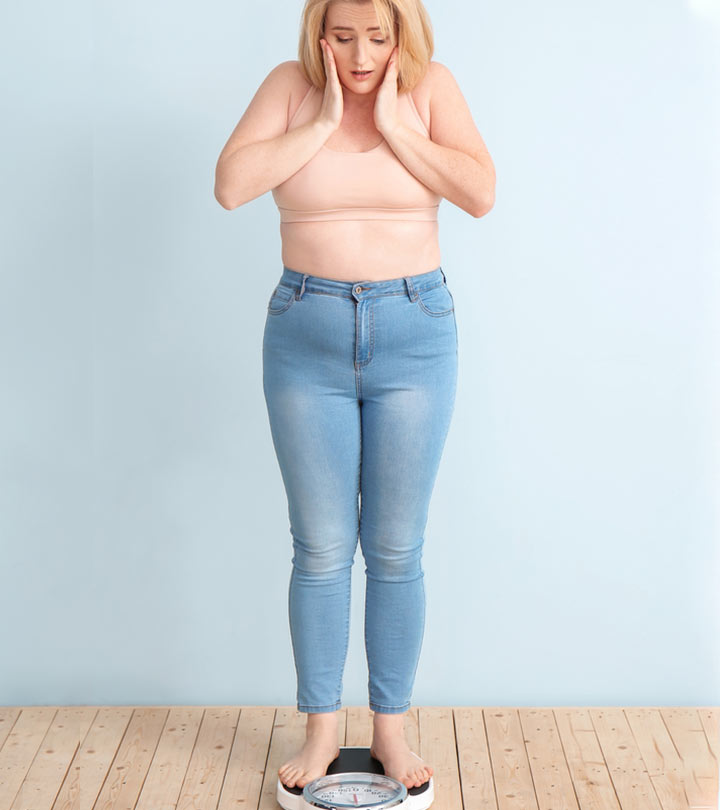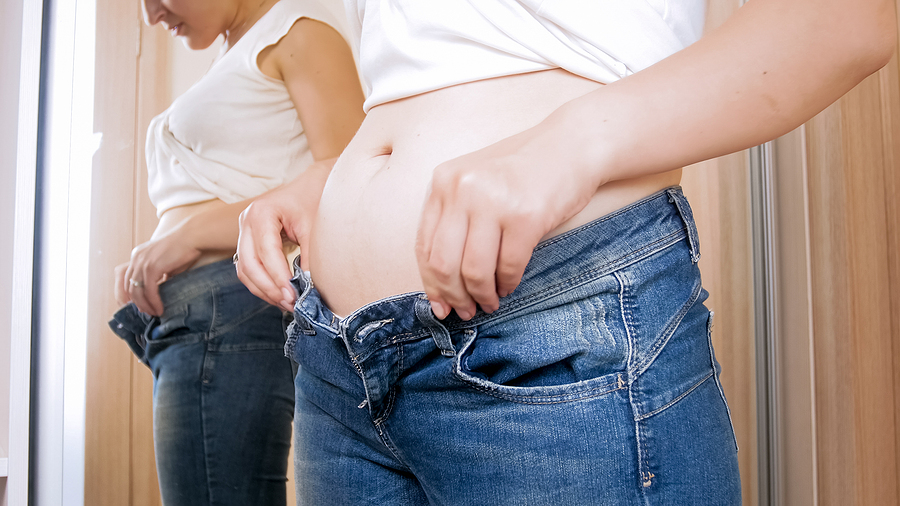Bloating is an uncomfortable sensation many experience after overeating or as a symptom of digestive issues. It manifests as abdominal swelling and feelings of fullness. With bloating becoming a more prevalent concern, the question arises – can temporary bloating lead to permanent weight gain over time? This blog post explores the mechanisms behind bloating, its causes, whether bloating itself can directly cause fat or weight gain, and evidence-based tips to relieve a bloated stomach.

Contents
Does Bloating Cause Weight Gain?
Here are a few key points about whether bloating can cause weight gain:
- Bloating is a temporary swelling or feeling of fullness in the abdomen, usually caused by gas, digestive issues, or hormonal fluctuations. It tends to come and go.
- Bloating itself does not lead to lasting weight gain. It is typically just a minor inflammation of the gastrointestinal tract, not an increase in body fat.
- However, some of the common causes of bloating – like constipation, a high salt diet, food intolerances, or hormonal changes – can promote water retention. This makes you feel bloated and heavier.
- Once the bloating subsides, any water weight gained from it will usually dissipate in a day or so. It’s not permanent weight gain.
- Bloating could be a sign of potential gastrointestinal issues that might promote mild weight gain over time if left untreated. But the bloating on its own will not stack on pounds.
The temporary abdominal bloating and swelling does not directly translate into fat gain or muscle gain. As long as any underlying condition causing recurrent bloating is treated, it should not lead to lasting weight gain.
Bloating vs Fat: How To Tell The Difference?
Telling the difference between bloating and fat can be crucial for understanding your body’s health and addressing concerns appropriately. Here are some key distinctions:

1. Symptom Onset and Duration:
Bloating: Often occurs suddenly and can fluctuate throughout the day or in relation to meals and specific foods.
Fat: Accumulates gradually over time as a result of a caloric surplus and does not fluctuate significantly in short periods.
2. Location and Feel:
Bloating: Primarily affects the abdominal area, leading to a feeling of tightness, discomfort, or fullness. The abdomen may feel hard or look visibly distended.
Fat: Can accumulate in various parts of the body, including the abdomen, hips, thighs, and arms. It feels soft and does not cause discomfort or tightness due to gas.
3. Physical Appearance:
Bloating: Causes a temporary increase in abdominal size, often making the stomach appear rounded and “puffed out.” This condition usually subsides.
Fat: Leads to a more consistent increase in body size or changes in body shape and composition over time.
4. Response to Physical Manipulation:
Bloating: Pressing on the bloated area might cause discomfort but won’t change the bloating significantly.
Fat: Feels soft and can be pinched or manipulated more readily than bloating.
5. Associated Symptoms:
Bloating: May come with other digestive symptoms such as gas, discomfort, and irregular bowel movements.
Fat: Does not directly cause discomfort unless it’s in the context of obesity-related health issues.
6. Lifestyle Factors:
Bloating: Can be influenced by diet (e.g., consumption of gas-producing foods, large meals), stress, and digestive disorders.
Fat: Influenced by overall lifestyle choices, including diet, physical activity, and metabolic factors.
Tips to Distinguish:
- Monitor symptoms: If the fullness fluctuates significantly throughout the day or in relation to meals, it’s likely bloating.
- Consider the duration: Sudden changes are more indicative of bloating, while gradual changes in body size are typically related to fat.
- Pay attention to diet and activity: If recent dietary habits or stress levels have changed without a corresponding increase in caloric intake, the issue may be bloating rather than fat gain.
How To Reduce Bloating & Lose Fat?
Reducing bloating and losing fat are distinct goals, but they can both be achieved through a combination of dietary changes, exercise, and lifestyle modifications. Here’s how to approach each:

To Reduce Bloating:
-
Identify Food Sensitivities: Common culprits include lactose, gluten, certain types of carbohydrates known as FODMAPs, and carbonated beverages. Keeping a food diary can help identify triggers.
-
Increase Fiber Gradually: Fiber helps with digestion, but adding too much too quickly can cause gas and bloating. Increase your intake slowly and drink plenty of water.
-
Stay Hydrated: Drinking enough water can help reduce water retention and support digestive health. Aim for at least 8 glasses a day.
-
Limit Salt Intake: Excess salt can cause the body to retain water, leading to bloating. Limit processed foods and season foods with herbs and spices instead of salt.
-
Eat Slowly: Eating quickly can cause you to swallow air, leading to bloating. Take your time to chew your food and enjoy your meals.
-
Exercise Regularly: Physical activity helps move gas through the digestive tract and can improve the function of your digestive system.
-
Probiotics: These can help balance the gut microbiota and improve digestion, potentially reducing bloating.
To Lose Fat:
-
Caloric Deficit: The fundamental principle for fat loss is to consume fewer calories than you burn. This can be achieved through diet, exercise, or ideally, a combination of both.
-
Balanced Diet: Focus on a diet rich in vegetables, fruits, lean proteins, whole grains, and healthy fats. These foods can help you feel full longer and reduce the temptation to snack on high-calorie, processed foods.
-
Regular Exercise: Include both cardiovascular exercises (like walking, running, cycling) and strength training in your routine. Muscle burns more calories at rest than fat, so increasing muscle mass can help with fat loss.
-
Sleep Well: Poor sleep can disrupt hormones that regulate appetite, making you more likely to overeat. Aim for 7-9 hours of quality sleep per night.
-
Manage Stress: High stress levels can lead to overeating or unhealthy eating, which can sabotage fat loss efforts. Practices like meditation, yoga, and deep breathing can help manage stress.
-
Stay Consistent: Fat loss is a gradual process. Stay consistent with your dietary and exercise habits, and make adjustments as needed based on your progress.
-
Monitor Progress: Use methods like progress photos, measurements, or how your clothes fit, rather than relying solely on the scale, as muscle gain may offset fat loss in your total weight.
Frequently Asked Questions
Can bloating cause significant weight gain?
Bloating may lead to a temporary increase in weight due to excess gas or water retention. However, it is not indicative of significant fat gain.
How can I reduce bloating in my midsection quickly?
To alleviate bloating swiftly, consider drinking plenty of water, avoiding gas-inducing foods, and engaging in light physical activity like walking.
Yes, inadequate sleep can disrupt hormones that control appetite and metabolism, potentially leading to weight gain in the midsection.
Can stress contribute to abdominal fat accumulation?
High-stress levels can trigger the release of cortisol, a hormone linked to increased abdominal fat deposition and weight gain.

Hello, I’m Ravindra. Over the years, I’ve immersed myself deeply into the world of fitness and health, transforming both my body and mind. Writing has allowed me to share my journey, insights, and expertise with those just starting out and seasoned fitness enthusiasts alike. Beyond just routines and diets, I believe in inspiring others to adopt a holistic approach to well-being.
